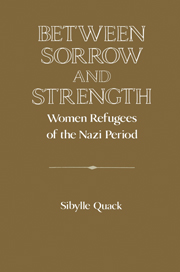Book contents
- Frontmatter
- Introduction
- Prologue: Jewish Women in Nazi Germany Before Emigration
- Part One A Global Search for Refuge
- 1 Jewish Women Exiled in France After 1933
- 2 Arrival at Camp de Gurs: An Eyewitness Report
- 3 Women Emigrés in England
- 4 England: An Eyewitness Report
- 5 Women Emigrés in Palestine: An Eyewitness Report
- 6 “Naturally, many things were strange but I could adapt”: Women Emigrés in the Netherlands
- 7 Refugee Women from Czechoslovakia in Canada: An Eyewitness Report
- 8 Women in the Shanghai Jewish Refugee Community
- 9 Shanghai: An Eyewitness Report
- 10 German-Jewish Women in Brazil: Autobiography as Cultural History
- 11 A Year in the Brazilian Interior: An Eyewitness Report
- Part Two Refuge in the United States
- Epilogue: The First Sex
- Index
5 - Women Emigrés in Palestine: An Eyewitness Report
Published online by Cambridge University Press: 05 January 2013
- Frontmatter
- Introduction
- Prologue: Jewish Women in Nazi Germany Before Emigration
- Part One A Global Search for Refuge
- 1 Jewish Women Exiled in France After 1933
- 2 Arrival at Camp de Gurs: An Eyewitness Report
- 3 Women Emigrés in England
- 4 England: An Eyewitness Report
- 5 Women Emigrés in Palestine: An Eyewitness Report
- 6 “Naturally, many things were strange but I could adapt”: Women Emigrés in the Netherlands
- 7 Refugee Women from Czechoslovakia in Canada: An Eyewitness Report
- 8 Women in the Shanghai Jewish Refugee Community
- 9 Shanghai: An Eyewitness Report
- 10 German-Jewish Women in Brazil: Autobiography as Cultural History
- 11 A Year in the Brazilian Interior: An Eyewitness Report
- Part Two Refuge in the United States
- Epilogue: The First Sex
- Index
Summary
Rachel Cohn was born in Hamburg in 1915. She emigrated in 1936 to France, where she married Leo Cohn. The couple spent the most of the war years with the Jewish underground movement. In 1944 Leo Cohn was arrested and sent to Auschwitz. He did not survive. After World War II Rachel Cohn emigrated to Palestine. There, she married Marc-Mordechai Cohn. She received a Master of Library Science degree from the Hebrew University in Jerusalem. In 1963 she was asked to develop and run Jerusalem's first municipal public library, which grew into a system of branch libraries. Since her retirement in 1980, Cohn has worked as a volunteer in various municipal libraries, the Israel Museum, the Hebrew University, and in private collections in Agnon and Tycho. In 1991 she received the title Yakirat Yerushalayim, distinguished citizen of Jerusalem. She has four children, eighteen grandchildren, and four great-grandchildren, all of whom live in Israel. This report was written in 1991.
To understand the fate of the Jewish women who left Germany after the Nazis came to power, it is necessary to look at the spiritual climate in which families lived before 1930. I would like to say some words about my parents' home. My parents were born in southern Germany, where their ancestors had lived for several generations. My mother came from a family of teachers. She attended a German elementary school and learned French and embroidering from the nuns in a convent. My father attended the Jewish teachers' seminary in Würzburg. After their marriage, they settled in Hamburg. My parents kept a traditional Jewish home but took part in the secular cultural life of Germany.
- Type
- Chapter
- Information
- Between Sorrow and StrengthWomen Refugees of the Nazi Period, pp. 89 - 96Publisher: Cambridge University PressPrint publication year: 1995



